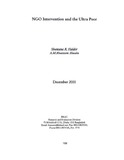| dc.contributor.author | Halder, Shantana R. | |
| dc.date.accessioned | 2019-09-12T09:46:36Z | |
| dc.date.available | 2019-09-12T09:46:36Z | |
| dc.date.issued | 2000-12 | |
| dc.identifier.citation | Halder, S. R., & Husain, A. M. Mm. (2000). NGO intervention and the ultra poor. Research Reports (2000), Economic Studies, (XVI), 189–210. | en_US |
| dc.identifier.uri | http://hdl.handle.net/10361/12557 | |
| dc.description.abstract | This report mainly discusses the perceptions of the ultra poor regarding NGO
membership and their future development needs if they join NGOs like BRAC. It also
focuses on reasons for membership discontinuation, issues of targeting and suggests
some alternative programme interventions useful for them. It was found that at the
time of survey 79% of the ultra poor living in BRAC villages did not ever have
membership of any NGO. Major reasons for non-participation were poverty and their
inability to pay regular installments due to lack of continuous income flow. Age limit
and vulnerability conditions also prevent some of them. Fifty-one percent of those
who are willing to join BRAC, wants to get some support mainly in asset creation,
loan receipt and in getting salaried job/wage employment. Only 12% want to get some
donations. Due to heterogeneity even among the ultra poor a single intervention
package would not be helpful for all. In designing any development programme for the
ultra poor the subsidy element should be necessary for reducing their food insecurity.
It also should consider all the elements of human poverty to address their
multidimentionality of poverty. | en_US |
| dc.language.iso | en | en_US |
| dc.publisher | Research and Evaluation Division, Brac | en_US |
| dc.subject | BRAC | en_US |
| dc.subject | Ultra poor | en_US |
| dc.subject.lcsh | Non-governmental organizations -- Bangladesh. | |
| dc.subject.lcsh | Poverty--Bangladesh. | |
| dc.title | NGO intervention and the ultra poor | en_US |
| dc.type | Research report | en_US |

